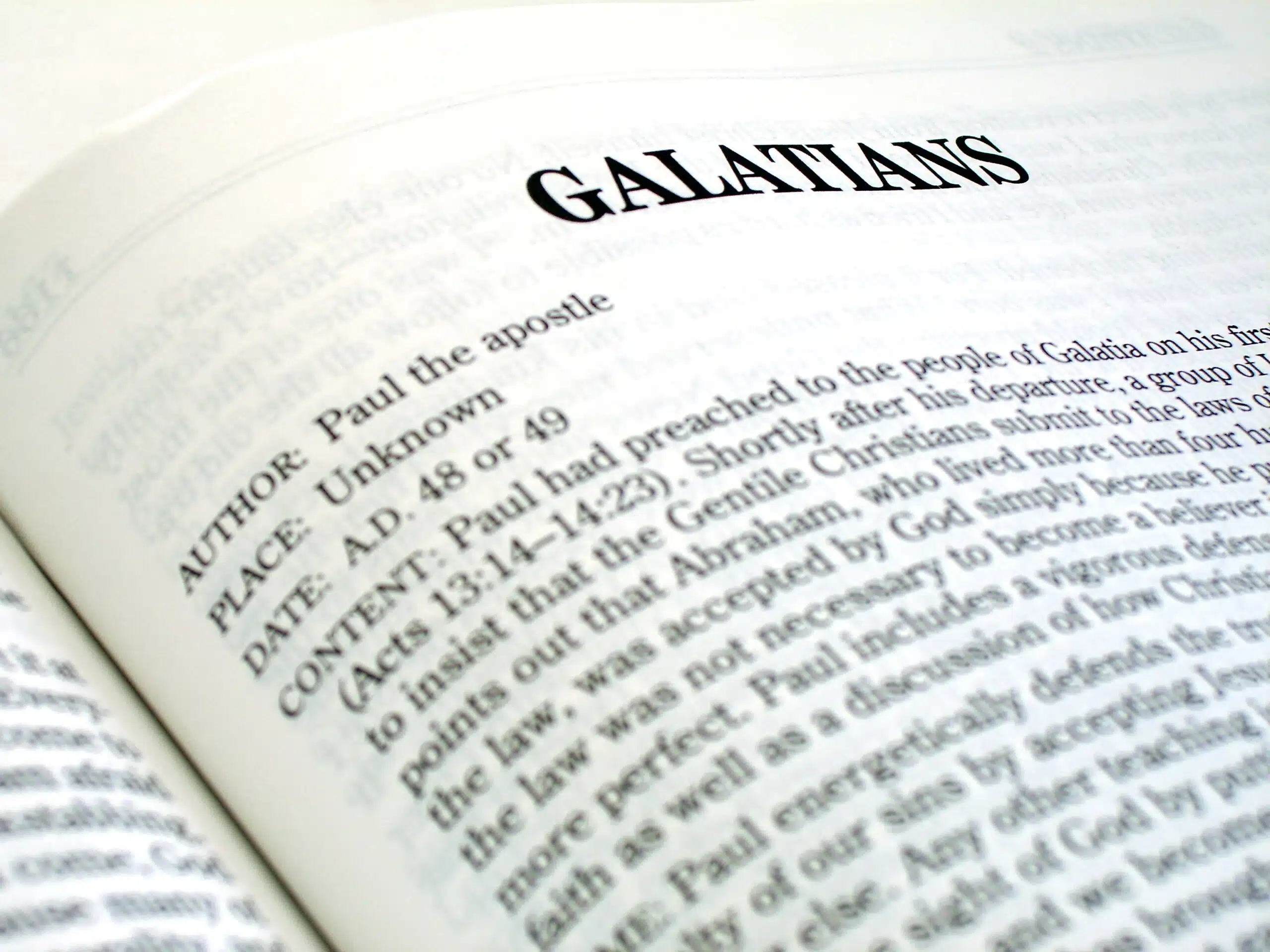Ephesians – Wayne Barber/Part 68

| By: Dr. Wayne Barber; ©2000 |
| Paul admonishes the Ephesians to “not be drunk with wine…but be filled with the Spirit.” How do we accomplish that? And how will that influence the way we live and relate to others? |
Ephesians 5:18
Be Filled With the Spirit – Part 1
Turn to Ephesians 5. We are coming to that verse that I have been looking forward to, verse 18: “And do not get drunk with wine, for that is dissipation, but be filled with the Spirit.”
Turn back to chapter 3 and to the prayer that I have told you over and over again has everything to do with the teaching of this book. It sums up chapters 1, 2 and 3 and sets up chapters 4, 5 and 6. You can see it bleed into almost everything Paul says in these last three chapters. In verse 16 of chapter 3, Paul says, “that He God would grant you, according to the riches of His glory (that refers to everything they have in Jesus Christ), to be strengthened with power through His Spirit in the inner man.”
Paul has told them that they have every spiritual blessing in Christ Jesus. Now, they are to be strengthened, and we are to be strengthened, according to what He has given to us. Verse 17 tells us the way we are strengthened is by our willingness to accommodate Jesus in all the areas of our life. How do we accommodate Him? We are willing to obey Him. It is by my willingness to surrender, my willingness to obey, that I am strengthened in the inner man by the Spirit of God. This thought in that prayer literally permeates the rest of the book. God lives in us. We have all of God we are ever going to get. Isn’t that wonderful? Now God wants to control us from within. He wants all of us. That is the key. The key is not getting any more of God. The key is God getting more and more of us.
In chapter 4 he tells them to put on the new man, the new garment, a brand new lifestyle. Remember, a garment is something that people see. Therefore, what he is literally saying in the context of his thought there is if you are strengthened on the inside, it is going to show up on the outside. The garment is a lifestyle. The Holy Spirit is living inside of me, strengthening me. The degree I am willing to surrender to Him is going to show up in a difference in the way I live and the way people see me on the outside.
In chapter 5, he tells them to imitate God’s love, and he warns them to walk wisely, making the most of the time. In verse 17 he says, “So then do not be foolish, but understand what the will of the Lord is.” I don’t think you can miss what he is saying here. He is talking about the will of the Lord. The general will of the Lord is that we obey Him in every area of our heart. But that willingness to obey gives us the ability to have wisdom from above in order to make wise decisions to redeem the time as we live as children of light in a world of darkness.
Paul continues the thought of walking wisely in a world filled with darkness in verse 18: “And do not get drunk with wine,…but be filled with the Spirit.” What does it mean to be filled with the Spirit of God? There are two things I want you to see, and they are in stark contrast to each other. The first part of the verse says, “And do not get drunk with wine.” The verb there is in the present tense. It means, “Don’t ever allow it into your lifestyle.” It is an imperative mood, which means it is a command. There is no option. It is also in the middle voice. We all have this responsibility. Never, ever, ever be drunk with wine.
Now why would Paul bring that out, especially in contrast with being filled with the Spirit of God? I love to look at historical settings and the culture of an area and what is going on during the period a person is writing his letter. For example, if you don’t know anything about Gnosticism when you look at I John, you miss the whole reason why John wrote the letter. It is helpful to know what is going on their time. What do they associate with pseudo-spirituality and those kinds of things? If I understand the setting and the culture of the time, “drunkenness” was a word used in religious circles. As a matter of fact, they thought drunkenness was a means of communing with their spirits and gods. In worshiping their “gods” in the pagan temples of that day, they would start with a wild frenzied dance and work them‑selves into an emotional peak. Then they would begin to drink wine. The drunker they got, the more they would act in all kinds of wild ways. Sexual orgies would break out and somehow, in their perverted way of thinking, they thought that when they got into this state of mind, totally influenced by the wine, totally intoxicated by the wine, far beyond clear thinking, that somehow they were moved into a realm to where they could communicate with their gods.
That was typical theology of that day. It had nothing to do with our God. It has nothing to do with true worship. That is what they were used to. The pagan cults, the pagan temples of that day, were filled with this kind of idolatry and immorality and debauchery. Let me give you an example of what was going on at Ephesus. You know that Artemis was their goddess. They had a huge temple for her. As a matter of fact, it was one of the seven wonders of the world at that time. People came from all over to see that temple. But that was just one of the pagan cults that was there. There was another heresy that many scholars think affected the Ephesians in Ephesus, and Paul had a lot to say about it. It was the Dynetian heresy.
They believed that the greatest of the gods was a god named Zeus. Zeus was his Greek name, and Jupiter was his Roman name. You can look through history and see how Satan has always tried to counterfeit anything that God has done, whether it be in myth or any other way. All he can do is pervert, counterfeit and deceive. This seems to be an evident counterfeit of the immaculate conception of the Lord Jesus Christ, Jesus being born of a virgin. Mary had never had any physical contact with Joseph. Jesus was conceived through the Holy Spirit of God. Well, isn’t it ironic that during that time, part of the mythology was that Zeus impregnated a goddess by the name of Samila? This goddess, without any contact whatsoever, all of a sudden became with child. One day she wanted to see the father of her child. So she approached Zeus. The mythology says that she got too close to his apparent glory and was incinerated to ashes. But before the unborn child in her womb could be burned up, Zeus reached into her womb, took the child out and attached it to his thigh. The child grew up and was born out of the thigh of Zeus. The child’s name was Dionius.
Now this infant god named Dionius was destined by Zeus to rule the earth. The legend popular at this time went on to say that the people that inhabited the earth at that time were not human beings. They were Titans. When they heard that Zeus had a plan for his son, Dionius, to rule the earth, they stole the child away and ripped him apart, limb from limb. But Zeus, always on the spot, the mythological god, somehow took the heart of Dionius, swallowed it and in some miraculous way they thought he recreated Dionius. Then he took his vengeance out on the Titans and with lightning, he smote them and they were burned to ashes. Now listen to this! Out of the ashes came the human race! You ought to take that to school next week and say, “Oh, you think you’ve got something? Let me tell you this one. Creation? Evolution? Hey, we came out of the ashes of the Titans on this earth. That is how the human race came into being.”
Dionius now is the god over the earth, over the human beings on this earth. Dioniuscame up with a form of religion of ascendancy. In other words, a man can rise to differentlevels of divine consciousness. This mystical system that everybody thinks is so new today,New Age, is not New Age. It has been going on ever since time has been here. You see,when God does something, Satan has to pervert it. People would rather believe his perver‑sion than the truth of what God says. This mystical system that he devised was comprised of wild music, frenzied dancing, sexual perversion, bodily mutilation, eating of the raw flesh of sacrificial bulls, and drunkenness. Dionius became known as the god of wine, and the intoxicating drink became the integral part of the pagan religion that surrounded him. Just as Zeus was known as Jupiter in Rome, Dionius was known as Bacchus in Rome, the same god but just a different name. The worship of him was celebrated with wild dancing, singing, drinking, and reveling that has for over 2,000 years been synonymous with drunkenness and sexual orgy. In Rome, they had a temple of Bacchus and it had huge columns that were profusely decorated with carvings of grape vines, which were symbolic of the excessive use of wine in their pagan worship.
Now this is some of the paganistic thought that was going on in the days that Paul wrote the letter to the Ephesians. You see, these Ephesian believers had come out of all this. Paul knew that drunkenness used to be a part of their religious ceremony, just like immorality, just like idolatry had been a part of it. They had come out of this. In 4:17, he said, “You can’t go back. You can’t live now as the Gentiles live. Look how they live and look what you have in the Lord Jesus Christ.” Paul knew it would be a temptation, so he brought the command to them never, ever be drunk with wine. The bottom line is as believers we don’t ascend to God by some intoxicating beverage. God has descended to us. He has sent His Spirit to live in us. God is in us. We don’t need anything from the outside to control us. We have everything on the inside to control us. The believer is to be controlled and influenced from the inside out, not from the outside in. So paganism is the exact reverse of what God has done. God came within us and gave us of Himself. Yet, they would still listen to the deceptive messages that said they needed to go back into this intoxicating type of lifestyle.
You see, when we are controlled from the inside it will produce a life that is holy. Remember what the word “holy” means? It is not as sanctimonious as you think. It simply means to be set apart in a class that is unique all by itself. Remember back in Acts at Pentecost when the Spirit came and they spoke in different tongues? Those tongues could be understood by all the people who were there regardless of their dialect or their particular language at the time. The people said, “Oh, I know what is wrong. They are filled with sweet wine. They are drunk.” Simon Peter stood up and said, “These men are not drunk with wine. Listen to what they are saying and watch how they are behaving and you will see that when you are controlled by the Spirit of God.” Your whole life edifies Christ. When you are controlled by anything else, it is easily seen in stark contrast. So you see, when you are controlled by something from the outside, you are nullifying the message.
Paul has already prayed for them to be controlled from the inside out. Now he says that being drunk with wine is dissipation. What does that mean? That took me a while to figure out. The word is asotia. It has the idea of not being able to save anything, but that is really not it. It has the idea of uncontrolled actions. It has the idea of wastefulness to the very worst degree. Titus 1:6 associates it with rebellion. I Peter 4:3-4 associates it with sensuality, lust, drunkenness, carousals, drinking parties, and abominable idolatries. You see, wine has no place in the life of a believer. Because you see, it is something that leads you into that which is corruptible, destructive and uncontrolled. Therefore, we are told never, ever, ever be drunk with wine. It has no place in the life of a believer. Peter says we have everything for life and for godliness, therefore, we need nothing from the outside.
In the book of Philippians, Paul said, “I have learned to be content in whatever circumstance I am in.” The word “content” means self-contained. Paul is not saying, “I am depending on myself,” Paul is saying, “I have everything within me that I need to face anything in this life. I don’t need anything out there, money or anything else. I have Him within me and I am complete in Him.”
So there is a stark contrast here. First of all he says, “Don’t get drunk with wine. That is dissipation. That is corruption. That is wasteful. That is a downhill spiral.” On the other hand he says, “Be filled with the Spirit of God.” I like that a whole lot better. We have already seen the word “filled” in Ephesians. You can’t just rip this one out of context and not put it together with the other one. Look back in 3:19: “and to know the love of Christ which surpasses knowledge, that you may be filled up to all the fulness of God.” In other words, what he is basically saying is, “Let all of God control all of you.”
The word pleroo has two meanings. It has the basic meaning and then sort of a sub-meaning. The sub-meaning is “to be satisfied with.” When you fill up a glass of water, it could be said to be satisfied because there is nothing else that can get into it. There is a sense in which it means satisfied. But the predominant meaning of the word is “to be dominated by, to be controlled by.” What fills a man controls a man.
It does not mean several things. I want to make sure you understand this. Being filled with the Spirit of God does not mean a dramatic and sudden experience that somehow catapults you into some kind of spiritual hierarchy, into a permanent state that is called the second blessing. Forget it. That is not what he is talking about here. As a matter of fact, we have every blessing in Christ Jesus. Why are we looking for the second one? I just wondered about that.
Secondly, it is not some act of our own flesh that seeks God’s approval. It is not an act of our own flesh. It is not somebody saying, “Okay, God, I love you and I am going to go out there and do your work and you help me out.” It has nothing to do with being filled with the Spirit.
Thirdly, it is not the same as possessing or being indwelt by the Spirit. You possess the Spirit because you are a child of God. You have the Spirit from the very inception of His coming into your life.
Fourthly, it is not a process of progressively receiving bigger and bigger doses of the Holy Spirit. Have you ever been around some of these pious, “I am more spiritual than you are” people? They walk around as if to say, “Man, I’ve got a bigger dose of the Holy Spirit yesterday. How much did you get?” They act as if what they did get more of God. That has nothing to do with what he is talking about being filled with the Spirit. You have all of God you will ever get. Remember, it is all of you that is the key.
Fifthly, it is not the same as the baptism with the Spirit. Remember, there is no such thing as the baptism of the Spirit. It is baptism with or by, by the means of. We are baptized into the body of Christ with the Holy Spirit. That is salvation. When we were baptized into the body, we received every spiritual blessing in Christ Jesus. In Him is the fullness of the Godhead bodily.
The verb used here in verse 18, “be filled with the Spirit,” tells us everything we need to know. It is in the present tense as was the command, do not be drunk with wine. In other words, it is being controlled, influenced by, dominated by the Holy Spirit of God. Of course, it is in the middle voice, which means each one of you individually. It is imperative. It is not an option. Do you realize that we are commanded to be filled with the Spirit of God? Before you point a finger at somebody who is in sin of one kind or another ask yourself the question, “Am I walking filled with the Spirit of God?” If you are not, you are in the same situation they are in. It may not be consequentially, but the sin is still there. We are commanded to be filled with the Spirit of God, to be constantly being controlled by the Spirit of God.
Now how in the world do you explain this? Take a glass of water. Some people think that being filled with the Spirit means to fill that glass up and guzzle it down. But after you do that it is empty. Now you have to be filled again, so you fill it back up and drink it down. Now it is empty, so you have to fill it up again. So you are constantly being filled, emptied, filled, emptied of the Spirit. No, that is not it! Take the glass, the same glass, and knock the bottom out of it. Make a conduit out of it, a pipe that something can travel through. Take that glass, put it into the water and let the river flow through it. That is being filled with the Spirit of God. The Spirit of God is already there. It hasn’t gone anywhere. You can’t empty yourself of Him. He is already there. However, you can clog it up. You can shut it down. You can stop the flow. So therefore, constantly in my life, I have to stay unhindered so the Holy Spirit of God can flow and minister His life through me. I can’t minister to anybody. I can’t do anything. It is Christ doing it through me.
What do I do? It involves several things. First of all, it involves a confession of sin. Confession is the word homologeo. It means to say to God, “You are exactly right. I want to agree with you. Everything in my life is a result of me. It is not the result of you. I’ve missed the mark, which is what the word sin means, and God, I agree with you.” The more I confess sin, the more I am aware of the old garment. The more I am aware of the old garment, the sicker I am going to get of it and the more I want to wear the new garment. Confession of sin is very, very important to the believer’s life. Moment by moment, day by day, it is constant.
I guess Romans 12:1-2 helped me more than anything else, when you think of being filled with the Spirit as involving confession of sin, surrender of will, surrender of intellect, surrender of body, surrender of time, surrender of talents, surrender of desires, and surrender of possessions. Romans 12:1-2 drew a picture of what it meant to be constantly “be being filled” with the Spirit of God.
It is a process folks, day by day, constantly being broken, constantly yielding. It is not an arrival. It is a pursuit. “I beseech you therefore brethren by the mercies of God that you present your bodies a living sacrifice.” Think of this as a blank sheet of paper. You sign the bottom of it and give it to God. It is like going to a surgeon who says, “I am going to do surgery on your life. Here is a blank sheet of paper. Sign it.” We say, “ No, I am not signing it if it is all blanks. What are the blanks for?” He says, “That is what I may have to cut out of you when I do surgery on you. Everything I cut out of you is keeping you from being everything you ought to be.” I am going to go home and check this guy out. God says to do the same thing for Him. Give Him permission to your body. Give Him permission to your life. Present yourself afresh day by day and moment by moment. “God, cut out of me anything that is hindering me from being everything you want me to be. I give you full rights to myself. I want nothing but what you want in my life.”
Let me ask you a question. Have you laid everything at the altar of Jesus Christ? Are you being filled with the Spirit of God? Are you so full of yourself that somehow you have meshed the two garments together to the point that you don’t know the difference from one or the other? You see, being filled with the Spirit is a constant, fresh, surrendered attitude to Jesus, constantly. He wants whatever it is that usurps His authority and right to be Lord and king of your life and of my life. What is it in your life? I want to tell you, folks, when you start letting Him control you, the garment comes on, the strengthening starts and it is all the same thing. He said the same thing three different ways. You need nothing from the outside. Oh, no. That is dissipation. You already have it on the inside. Be strengthened from the inside out, not from the outside in.





